Timeless Alexander Pope Quotes for Wisdom and Reflection
Alexander Pope might have lived in the 18th century, but his words still hit home today.
As one of England’s greatest poets, known for classics like “An Essay on Criticism“ and “The Rape of the Lock“, Pope had a unique ability to blend sharp wit with deep insight into human nature.
His quotes aren’t just lines from old poems—they’re timeless nuggets of wisdom that make you pause and think.
In this post, we’ll explore some of Pope’s most thought-provoking quotes.
Whether you’re looking for a little life advice or just some words to reflect on, Pope’s insights are perfect for today’s world. Let’s dive in!
Content
Famous Alexander Pope Quotes on Life and Humanity


Alexander Pope’s reflections on life and humanity offer timeless wisdom. His ability to capture profound truths in a concise manner is what makes his quotes memorable and thought-provoking.
Below are some famous quotes from Pope, along with brief explanations of their meanings and contexts.
1. “To err is human, to forgive, divine.”

We all make mistakes—that’s just part of being human. But forgiveness? That’s something greater, something almost divine.
This quote reminds us that it’s not about avoiding mistakes, but about rising above them by forgiving others. It’s a gentle nudge toward kindness and understanding.
2. “Hope springs eternal in the human breast.”
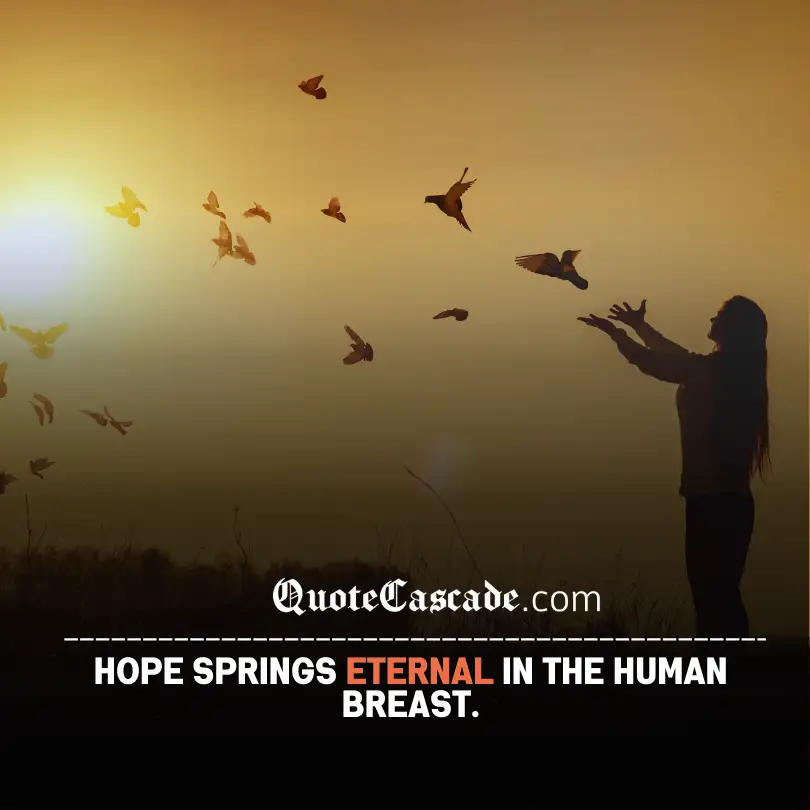
No matter how tough life gets, we always manage to hold onto hope. Pope is saying that hope is just built into us—we keep believing in better days, even when things look bleak.
And honestly, isn’t that a beautiful part of being human? It’s what keeps us going.
3. “Fools rush in where angels fear to tread.”

Ever notice how some people dive headfirst into things without thinking? That’s what Pope is pointing out here.
Sometimes, those with the least wisdom take the biggest, and often most reckless, risks—places even the wise would avoid. A good reminder to pause and think before acting.
4. “Blessed is he who expects nothing, for he shall never be disappointed.”


Expectations can lead to a lot of heartache, right? Pope’s saying that if you lower your expectations, you might save yourself from disappointment.
It’s a bit cynical, sure, but there’s some truth in it. Sometimes, expecting less can bring unexpected joy.

5. “A little learning is a dangerous thing.”
This one’s about knowledge and how knowing just a little bit can be risky. You think you know everything, but in reality, you’re just scratching the surface. It’s a reminder to keep learning, because a small amount of information can lead to misunderstanding or overconfidence.
6. “Act well your part; there all the honor lies.”

No matter what role life gives you—big or small—it’s about how you play it.
Pope is saying that honor doesn’t come from the position you hold but from how well you perform your duties.
It’s about giving your best effort, no matter what.
7. “The proper study of mankind is man.”
Pope believed that the most important thing we can do is understand ourselves and each other.
We spend so much time studying the world around us, but the real mystery lies in human nature itself. It’s an invitation to self-reflect and think about what makes us, well, us.
8. “What some call health, if purchased by perpetual anxiety about diet, isn’t much better than tedious disease.”

This feels so relevant today, doesn’t it? Pope is saying that obsessing over being healthy can sometimes be as bad as being sick.
Balance is key. Sure, take care of yourself, but don’t let the anxiety of being “perfect” ruin your peace of mind.
9. “An honest man’s the noblest work of God.”
There’s something so pure about this one. Pope is saying that the greatest thing anyone can be is honest—simple, but powerful.
Integrity is what matters most, above all else. It’s a nice reminder in a world where truth can sometimes feel hard to find.
10. “He who tells a lie is not sensible how great a task he undertakes, for he must invent twenty more to maintain that one.”

Lies have a way of spiraling out of control. Pope is giving us a practical life tip here—once you tell one lie, you end up having to tell more to cover it up.
The truth is just so much simpler. Honestly, haven’t we all learned this the hard way?
11. “One truth is clear, whatever is, is right.”
This quote can be a bit tricky. Pope isn’t saying everything that happens is good, but rather, everything has its place in the grand scheme of things.
It’s about accepting life’s events, trusting that things are unfolding as they should, even if we don’t fully understand them yet.
12. “Do good by stealth, and blush to find it fame.”

Pope believed that true goodness is done quietly, without seeking praise. It’s about doing the right thing because it’s right, not because you want attention or recognition.
There’s a quiet beauty in this idea—let your actions speak, not your desire for credit.

13. “All nature is but art, unknown to thee.”
There’s a sense of awe in this quote, as Pope reflects on how nature, in all its beauty and complexity, is a form of art we can’t always understand.
It’s humbling, reminding us that there’s so much more to the world than what we can see or comprehend.
14. “Be not the first by whom the new are tried, nor yet the last to lay the old aside.”
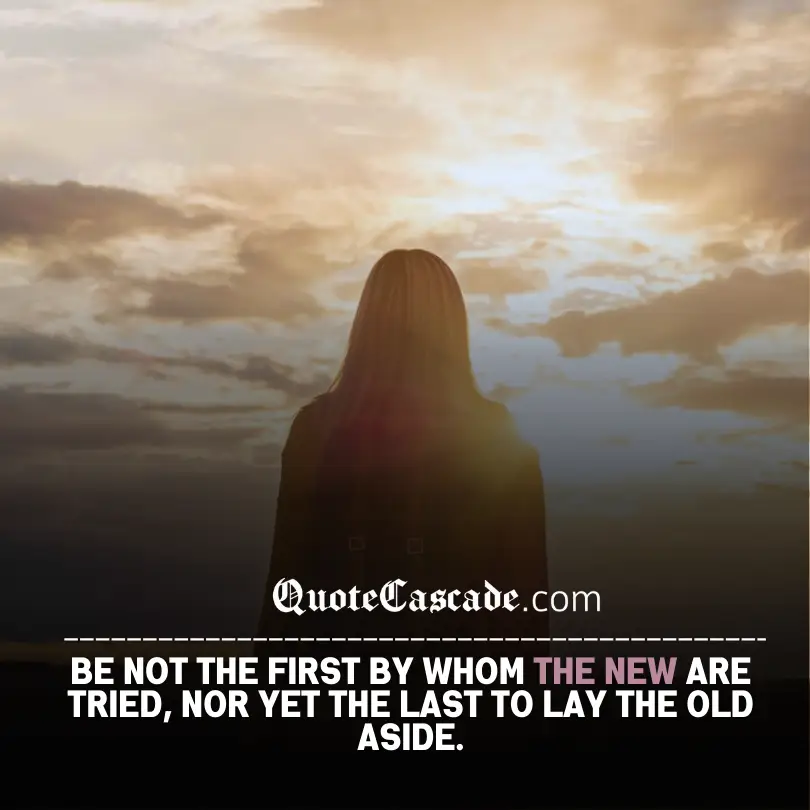
Pope’s advice here is about finding balance. Don’t rush to embrace every new trend or idea, but also don’t cling to the old just for the sake of tradition.
It’s a call for thoughtful, balanced change—embracing the new when it’s time, but not before it’s proven.
15. “Honor and shame from no condition rise; act well your part, there all the honor lies.”
This quote comes back to the idea that your worth isn’t determined by your status or position in life.
It’s how you act, how you treat others, and how you carry yourself that matters most. No matter where you are in life, doing your best is where true honor lies.
Alexander Pope on Knowledge and Learning

Alexander Pope’s views on the pursuit of knowledge emphasize the importance of deep understanding and the dangers of intellectual arrogance.
His reflections on learning and wisdom offer timeless insights into how we should approach education and the quest for knowledge.
1. “A little learning is a dangerous thing, drink deep, or taste not the Pierian spring.”
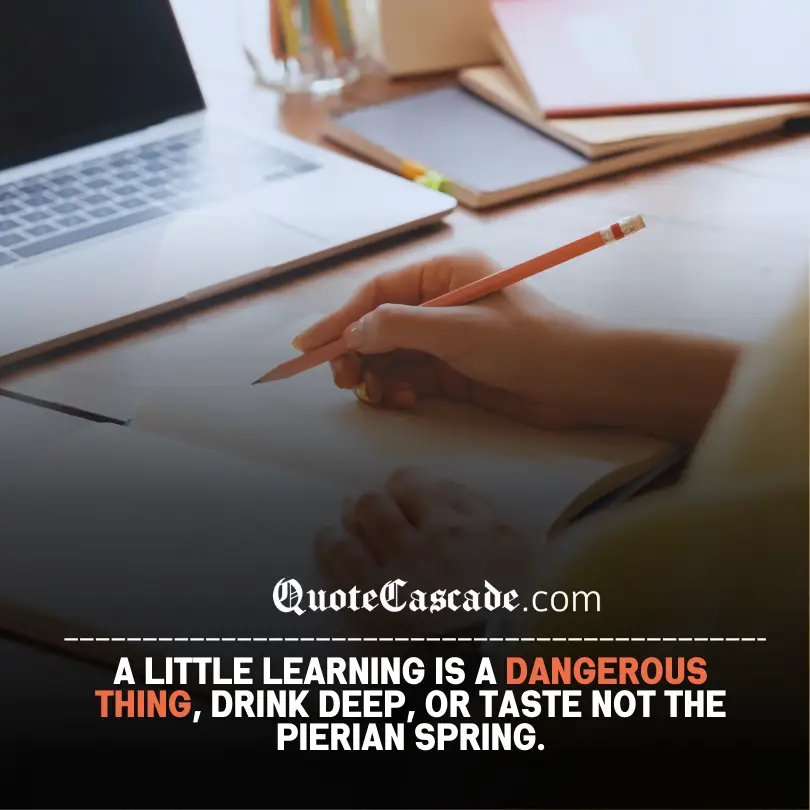
In this quote, Pope warns against the dangers of superficial knowledge.
The Pierian spring symbolizes a deep well of inspiration and knowledge, and Pope urges us to seek profound understanding rather than a mere surface-level grasp.
Historically, this aligns with Enlightenment ideals, where deep intellectual pursuit was celebrated, and shallow knowledge was criticized for leading to overconfidence.
2. “The proper study of mankind is man.”

This famous line from An Essay on Man reflects Pope’s belief that humanity’s most important pursuit is self-understanding.
Instead of obsessing over the mysteries of the universe, Pope suggests that we should focus on understanding human nature.
During his time, this quote resonated with the Enlightenment’s humanistic focus on self-awareness and introspection.

3. “Fools admire, but men of sense approve.”


In this quote, Pope contrasts admiration with thoughtful approval. He emphasizes that while fools are easily impressed, wise individuals take the time to evaluate before endorsing something.
This reflects the importance of discernment and critical thinking in learning, a value deeply held during Pope’s era when intellectual debate and reason were highly regarded.
4. “True ease in writing comes from art, not chance, as those move easiest who have learned to dance.”
Pope uses this metaphor to explain that mastery, particularly in writing, comes from dedicated learning and practice, not from luck.
He compares writing to dancing, suggesting that just as dancers move gracefully through practice, so do writers develop fluency through learning their craft.
This reflects Pope’s broader belief in discipline and learning as essential to achieving true skill.
5. “A work of art that contains theories is like an object on which the price tag has been left.”

Here, Pope argues that art should speak for itself and not be overshadowed by intellectualism.
When applied to learning, it suggests that knowledge should be lived and experienced, not just bogged down in complex theories.
Pope’s view aligns with Enlightenment debates on simplicity, where many thinkers advocated for clarity and directness in both art and intellectual pursuits.
6. “Men must be taught as if you taught them not, and things unknown proposed as things forgot.”

In this quote, Pope suggests that the best way to teach is subtly, by making new knowledge feel familiar and intuitive to the learner.
Rather than imposing information, learning is more effective when it feels natural.
This idea aligns with educational methods from Pope’s time, which valued dialogue and reflection over rigid instruction.
Wit and Satire: Alexander Pope’s Clever Commentary
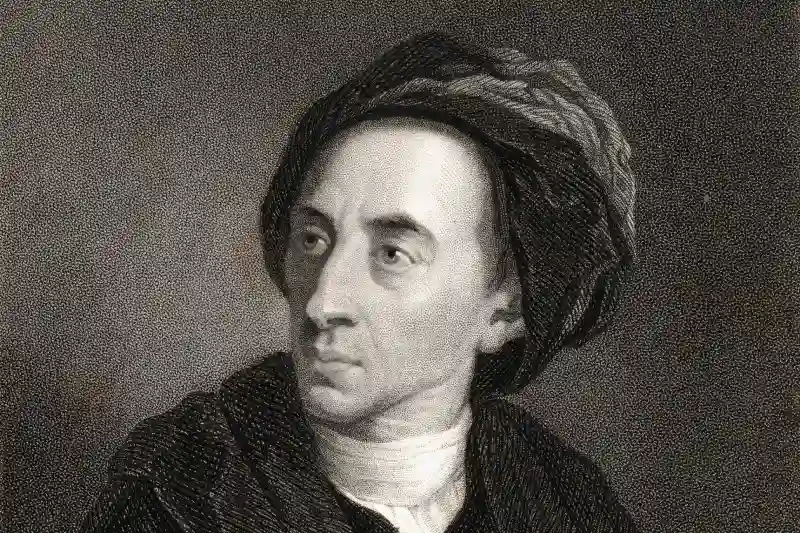
Alexander Pope was famous for his sharp wit and incisive social commentary. Through satire, he critiqued the hypocrisies and follies of 18th-century society, exposing human flaws with humor and intelligence.
Pope’s clever wordplay, irony, and biting wit made his observations timeless.
Below are 12 quotes that capture his humorous and critical take on societal norms.
1. “Blessed is he who expects nothing, for he shall never be disappointed.”

Pope humorously critiques human expectations and suggests that the secret to happiness is setting low or no expectations at all. It’s a witty jab at how often our hopes lead to disappointment.
2. “Fools admire, but men of sense approve.”
This line points to the difference between blind admiration and thoughtful judgment. Pope uses his wit to distinguish between shallow praise and meaningful approval, poking fun at society’s tendency to be easily impressed.
3. “Party-spirit at best is but the madness of many for the gain of a few.”
A satirical comment on politics, Pope exposes how partisanship often benefits only a small group while many follow blindly. His wit here underlines the irrational nature of political fanaticism.
4. “The hungry judges soon the sentence sign, and wretches hang that jurymen may dine.”
Pope’s satire on the justice system highlights its flaws by suggesting that decisions are made hastily and without true consideration — more for convenience than for justice. His humor, though dark, critiques the superficiality and corruption in legal proceedings.
5. “What’s fame? A fancied life in others’ breath.”
With this line, Pope mocks the pursuit of fame, reducing it to nothing more than the fleeting opinions of others. It’s a witty reminder of how trivial public recognition can be.
6. “At every word a reputation dies.”
In this clever observation, Pope critiques gossip and the ease with which society ruins reputations through mere words. His humor highlights the destructiveness of idle chatter and slander.
7. “Some people will never learn anything, for this reason, because they understand everything too soon.”
Pope humorously critiques arrogance, pointing out that people who think they know everything never truly learn. It’s a sharp comment on intellectual vanity and the dangers of closed-mindedness.
8. “Pride, the never-failing vice of fools.”
In this concise jab, Pope criticizes pride as the defining flaw of the foolish. His wit lies in the bluntness of the statement — no frills, just a sharp assessment of human folly.
9. “Too much of a good thing is good for nothing.”
Here, Pope’s humor shines as he warns against excess, even in positive things. His satire applies to human tendencies to overindulge, reminding us that moderation is key.
10. “Be not the first by whom the new are tried, nor yet the last to lay the old aside.”
With this witty piece of advice, Pope pokes fun at both people who rush to adopt every new trend and those who stubbornly cling to the past. It’s a call for balance — don’t be the trendsetter, but don’t be the last to adapt either.
11. “Man never thinks himself happy, but when he enjoys those things which others want or desire.”
Pope satirizes human envy, suggesting that our happiness often depends on having what others lack. It’s a sharp critique of the way society measures success by comparison, rather than true fulfillment.
12. “Honor and shame from no condition rise; act well your part, there all the honor lies.”
This line critiques society’s obsession with status and outward appearances. Pope’s humor lies in the simplicity of his advice: it’s not your social condition that defines honor, but how you act. It’s a timeless reminder of integrity over image.
Pope’s wit and satire reveal his keen understanding of human nature and society’s flaws. Through humor, he critiques politics, pride, vanity, and more, reminding us that many of our societal norms are ripe for reflection — and perhaps a bit of laughter.
Alexander Pope on Friendship and Relationships
Alexander Pope’s reflections on friendship, loyalty, and human connections are thoughtful, offering insight into how we navigate our relationships with others.
His observations on human interactions remain relevant today, reminding us of the complexities and importance of true connections.
Let’s explore some quotes from Pope that talks about the nature of friendship and relationships.
1. “Trust not yourself, but your defects to know; make use of every friend and every foe.”

Pope offers a reminder that we shouldn’t be overly confident in our own judgment but should instead rely on the feedback we get from others — friends and even enemies.
Friends offer support, but foes can teach us about our weaknesses. In today’s world, this quote speaks to the value of self-awareness and learning from criticism, both from those who care for us and from those who challenge us.
2. “Histories are more full of examples of the fidelity of dogs than of friends.”
With a touch of humor and cynicism, Pope reflects on the loyalty found in animals, especially dogs, compared to the often unpredictable loyalty of human friendships.
This quote remains relevant as a reminder that while human relationships can be rewarding, they can also be fragile and inconsistent.
In modern times, it speaks to how genuine loyalty and trust can be rare and, when found, should be treasured.
3. “Who friendship with a knave hath made, is judged a partner in the trade.”
Pope warns that the people we associate with reflect back on us. If we form close friendships with dishonest people, we risk being judged for their actions as well. This remains highly relevant today, where personal and professional associations can affect one’s reputation, and choosing friends wisely is key to maintaining integrity.
4. “At every word, a reputation dies.”

This quote highlights the fragility of reputation and the power of words. In relationships, especially friendships, what we say about others can have a lasting impact.
Today, in the age of social media and instant communication, Pope’s words ring even truer — a careless remark can quickly damage relationships and reputations.
It’s a reminder to be mindful of what we say and how we speak about others.

5. “Tis thus that on the choice of friends, our good or evil name depends.”
Pope emphasizes the importance of choosing friends carefully, as the company we keep can shape how we are perceived by others.
In today’s world, this quote remains relevant, particularly in how our social circles influence our behavior, decisions, and public image. It serves as a caution to be mindful of who we allow into our lives.
6. “True friendship’s laws are by this rule expressed — welcome the coming, speed the parting guest.”
This quote highlights Pope’s belief in the natural ebb and flow of relationships.
True friendship is not about clinging to people but about welcoming them warmly when they come and letting them go gracefully when they leave.
In today’s fast-paced world, where people move frequently and relationships change, this idea encourages us to embrace the impermanence of friendships and honor the time spent with those we care about.
7. “The most sacred of the duties of a friend is to offer what they want.”


Pope believed that true friendship involves not just companionship but also understanding what your friend needs and offering it — even if they don’t ask for it.
In today’s context, this quote is a reminder of the importance of empathy, being present, and providing support when it matters most.
Alexander Pope Quotes on Nature and Beauty
Alexander Pope had a deep admiration for the natural world, seeing it as a source of inspiration and a symbol of order. His reflections on nature often blend awe with philosophical musings, offering insight into the harmony between humanity and the environment.
Well, here we can explore some of his quotes where he expresses his admiration for nature’s beauty and order.
1. “Nature and nature’s laws lay hid in night; God said, Let Newton be! and all was light.”

Pope is celebrating the breakthroughs of Sir Isaac Newton, whose discoveries revealed the underlying order of the universe.
This quote reflects Pope’s belief in the harmony of nature and its discoverable laws. It shows that, to Pope, nature isn’t just beautiful — it’s deeply structured, waiting to be understood.
2. “All are but parts of one stupendous whole, whose body nature is, and God the soul.”
Pope sees nature as a unified whole, with God as its guiding spirit. This quote expresses his belief in the interconnectedness of all living things, a sentiment that resonates with modern environmental ethics.
In a time of climate crisis, Pope’s reflection encourages us to see nature as a cohesive system that we are all a part of, deserving respect and protection.
3. “First follow Nature, and your judgment frame by her just standard, which is still the same.”
Pope advises us to look to nature as the ultimate guide for decision-making and moral judgment. Nature, in its constancy, represents an ideal standard that is unchanging and reliable.
In today’s world, this quote can be seen as a call to live sustainably and align human activities with the natural world’s balance.
4. “See, through this air, this ocean, and this earth, all matter quick, and bursting into birth.”
Pope marvels at the cycle of life present in all of nature. This line celebrates the beauty and vitality of the natural world, constantly creating and renewing itself.
His reverence for the earth’s processes reflects a mindset that values the earth’s resources and emphasizes the importance of natural regeneration, an idea that aligns with modern ecological perspectives.
5. “Nature, like liberty, is but restrained by the same laws which first herself ordained.”
Pope is reflecting on the inherent rules that govern nature, suggesting that freedom (whether of nature or society) exists within certain bounds.
This perspective can be applied to modern environmental discussions, where the balance of nature must be respected, and human freedom to exploit resources should be checked by the laws of nature itself.
6. “In all the madness of superfluous health, the trim of luxury, the glare of wealth, let this great truth be present night and day; but most be present, if we preach or pray.”
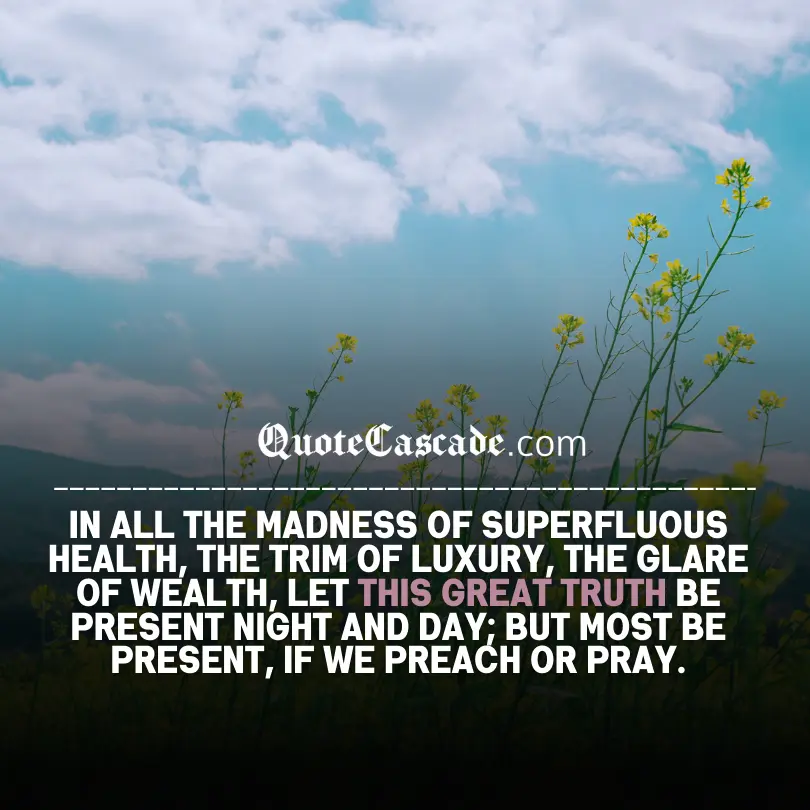
Pope contrasts the excesses of wealth with the simplicity of nature, reminding us that, despite our luxuries, nature’s truth should guide us.
In the context of today’s consumer-driven society, Pope’s words call for a return to natural simplicity and balance.
7. “Consult the genius of the place in all; that tells the waters or to rise, or fall.”
This quote suggests that nature has its own wisdom, and we should respect and listen to it.
In modern terms, this can be interpreted as a call for environmental stewardship — to understand the unique needs and balance of each ecosystem and act accordingly to preserve them.
Conclusion: Alexander Pope’s Legacy of Thought and Insight
Alexander Pope wasn’t just a brilliant poet—he had a way of distilling life’s biggest truths into short, impactful quotes that still resonate today. His words, whether about human nature, humility, or perseverance, offer timeless wisdom we can all relate to.
Pope’s quotes are powerful because they speak to both the struggles and beauty of life. They can inspire you to reflect, push through challenges, or simply see things from a new perspective.
His insights are just as relevant now as they were in his time.
If you haven’t already, dive into more of his work—it’s full of thought-provoking ideas. And if you have a favorite Pope quote, share it in the comments below! You can also learn more about him on hisWikipedia page. Let’s keep the conversation going—his wisdom is still worth sharing today.






